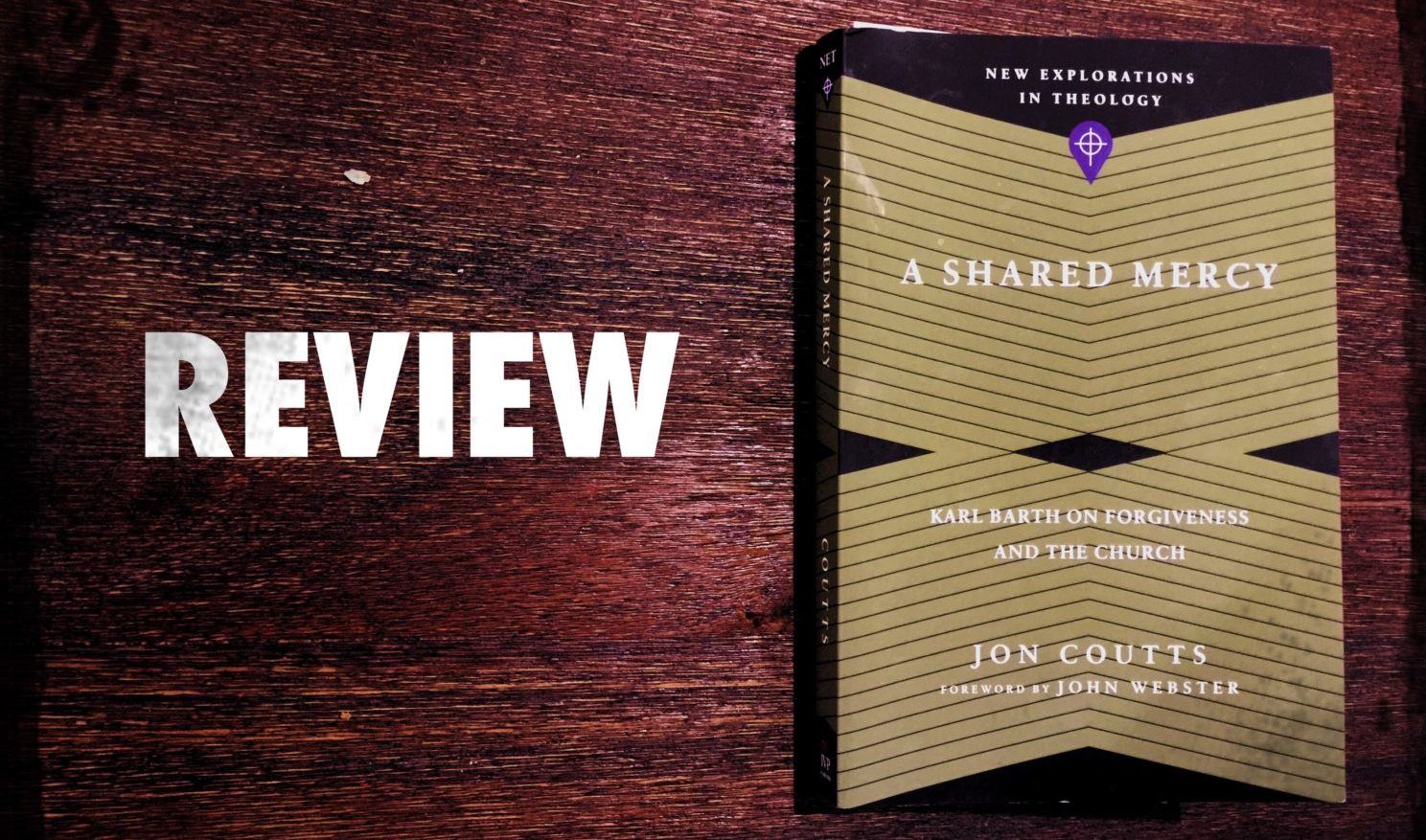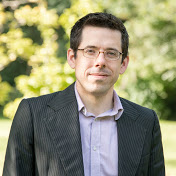
As a former pastor myself, I've struggled to understand and apply the Church Dogmatics, so I was excited to read A Shared Mercy, to help me understand Barth's "Doctrine of Reconciliation" (CD IV) generally, and the theology of forgiveness specifically. In lieu of a full review, I will share a few highlights from the book that I found helpful and that provide a sample of the book.
A Shared Mercy is John Webster Approved
The very first thing that caught my eye about A Shared Mercy is that it includes a foreword by John Webster (1955—2016) who was a pinnacle Barth scholar. Webster's endorsement of A Shared Mercy made me anxious to dig into Coutts' book, especially since Webster died last year before the book was published. In Webster's foreword he praises Karl Barth's "the fourth volume of the Church Dogmatics" as a "work of his greatest maturity" and then goes on to praise Jon Coutts by saying "though other students of Barth have gestured towards the importance of forgiveness in Barth's conception of Christian faith and teaching, the topic has until now received no full or adequate treatment."
Webster is not the only significant endorsement of A Shared Mercy; the back cover includes praises by David Guretzki (who also wrote a book I recently reviewed) and on the inside cover by Dr. W. Travis McMaken (who I've also reviewed); this strong set of references would be difficult for any Barth scholar today to exceed!
And now, let's get into the book.
Anecdotes from A Shared Mercy
Coutts develops his theology of forgiveness through commentary on Karl Barth's Church Dogmatics, Volume 4, but this commentary is not a word-by-word, or sentence-by-sentence commentary like most Biblical Commentaries published today, nevertheless, it is a sort-of-layman's commentary on CD IV with many direct quotations and references to CD IV. So don't be scared away by the word "commentary". I've selected two quotations from Chapter 2, "Forgiveness in Church Dogmatics IV" to exemplify Coutts' method. Both quotations are from the section with the heading "Justification: Freed from sin for good (§61)".
I've selected these two examples as a first impression to A Shared Mercy that I particularly enjoyed; there maybe better samples to share, but these two quotations apply to real life experiences I've had in the Church.
1. Forgiveness and Conversion
The first example is in Chapter 2 "Forgiveness in Church Dogmatics IV", where Coutts provides a survey of his theology of forgiveness; in this section, Coutts explains how a person's entire history matters, not only the time after that person was converted to Christianity and received forgiveness for their past sins. In the following quotation, Coutts makes an insightful observation about how Jeremiah 31:34 "remember their sins no more" is wrongly interpreted as "forgetting", and this should be corrected to "remembering no more."
It is important to note that in the resurrection of Christ's incarnate flesh we have an affirmation of the continuing historicity of human being. If justification were simply a "nominalistic 'as if'" (a notion Barth thinks is "quite incompatible with truthfulness of God and cannot be of any real help to man") then the persons involved could hardly be said to be the same persons after they had been forgiven. In asserting this Barth does not mean to lock sin at the essence of their identity, but to affirm that they are persons with histories:
The man who receives forgiveness does not cease to be the man whose past (and his present as it derives from his past) bears the stain of his sins. The act of the divine forgiveness is that God sees and knows this stain infinitely better than the man himself, and abhors it infinitely more than he does even in his deepest penitence--yet He does not take it into consideration. He overlooks it, He covers it, He passes it by. He puts it behind Him. (CD IV/1, p.597)
The language of "overlooking" is here employed for the purposes not of denial but of overcoming. In justification we have not an "as if" but a "creative work of God" in which the old (which is present but belongs to our past) has been superseded by the new that comes in Christ. In Barth's reckoning, the "divine pardoning is not a weak remission"; rather, it is an "act of divine power and defiance" in which God despises sin, refusing on the basis of the emptied cross and tomb to allow the ensuing history to be determined by it.
When in Jeremiah 31:34 God promises to "remember their sins no more," it is often taken to mean that God forgets sin, but it is worth noting that God is not literally said to be forgetting, but to remembering no more. This is not a game of semantics, but an issue wherein an uncertain phrase must be defined with appropriate theological content. [2]
2. Forgiveness and Sanctification
The second example is also from Chapter 2, where Coutts keenly exposes a semi-pelagian trend in American Evangelicalism, that occurs when people believe that salvation cleanses an individual from past sins and enhances that individuals such that they are able to overcome sin through their own efforts. I'm a presbyterian now, so I don't encounter perfectionism often, but when I was younger and in other protestant churches, I did encounter people who believed that they could attain sinlessness by their own efforts (which they acquired during their conversion to Christianity). So I was encouraged by Coutts' opposition to this form of "crippling pietism" in the next quotation (and surrounding chapter) because even after conversion, Christians are still in continual need of of grace and Jesus Christ.
One of the assumptions that ought not to leak into a doctrine of sanctification is the notion that, once justified, believers have the process of sanctification left up to them and their efforts to imitate Christ. Barth's adamancy about this point cannot be missed. "The New Testament," writes Barth, "knows nothing of a Jesus who lived and died for the forgiveness of our sins, to free us as it were retrospectively, but who now waits as though with tied arms for us to act in accordance with the freedom achieved for us."
Accounts of sanctification may too often be cross centered without being amply resurrection oriented, thus rendering the sinner forgiven by the work of Christ and then set loose to act, presumably by tapping in to some now-accessible latent goodness. Once justified, if all that remains is to develop spiritual disciplines and community mores to carry the load of Christ's demands, we have something like a moralization of grace, a works without faith. This can lead to a crippling pietism. The more the sinner "succeeds in achieving inner harmony, the less he can be reconciled with God and used by Him," Barth writes, explaining that it is not the "seriousness or consistency" of the saints which sanctifies them, but only "the sanctity of the One who calls them and on whom their gaze is not very well directed." [3]
Conclusion
Dr. Jon Coutts has a Ph.D. from Aberdeen University and is a tutor of theology and ethics at Trinity College in Bristol, England and his book, A Shared Mercy, was published by IVP Academic in 2016. Although I've only scratched the surface of A Shared Mercy, and although I haven't provided a complete review of all the features of this book, I hope that I've enough introduction to encourage anyone who desires to understand Karl Barth's theology of forgiveness to read this great new book.
References:
[1] John Coutts, beyond sunday blog, http://thissideofsunday.blogspot.ca/p/about-cv.html
[2] Coutts, Jon. A Shared Mercy: Karl Barth on Forgiveness and the Church. Downers Grove, IL: IVP Academic, an Imprint of InterVarsity, 2016. 48. Print.
[3] Ibid. 47.
Related: A Shared Mercy, CD IV, CD IV.1, Church Dogmatics, Church Dogmatics IV, Church Dogmatics IV.1, Forgiveness, Jon Coutts, Karl Barth




February 27th, 2017 - 17:37
“…foreword by John Webster (1955—2016) who was a pinnacle Barth scholar and American Evangelical.”
Webster was an English theologian, ordained in the C of E, and spent most of his career in the UK, namely Scotland. He was admired by many American evangelical scholars, but he was not an American evangelical.
February 27th, 2017 - 19:37
Kevin, you are correct. This is an error, and I’ve amended the blog. Not sure how that slipped it.